How to Use:
Grow elementary students’ content knowledge, civic dispositions, and critical thinking skills with our K-5 curriculum that makes teaching social studies easy and fun. Students work together to solve each mystery and develop life-long inquiry skills.
Key features
Organized by grade level and topic, these whole-class, mystery-themed units make teaching social studies fun. Guide elementary students through exciting historical investigations to build content knowledge, civic dispositions, and critical thinking skills.
Standards-aligned
Reduce time searching for materials and make teaching civics easy and relevant with lesson plans that meet state standards.
Engaging lessons
Ignite student interest and make social studies fun with whole-class, mystery-themed units that teach lifelong inquiry skills and primary sources analysis.
Timely
Easily incorporated into your curriculum and class time, lessons require 40 minutes or less to complete.
Illuminate untold stories
Introduce students to a diverse and inclusive range of stories with lessons that draw connections between history, civics, geography, economics, and students’ lives.
Explore Units by Grade
Kindergarten
- Introduction to Inquiry Mysteries, Grades K-1
- What is the Difference Between Then and Now?
- How Do We Celebrate Our Shared Traditions?
- How Can Civic Virtue Help Me Be a Good Citizen?
- How Can Perseverance Help Me Be a Good Citizen?
- How Can Generosity Help Me Be a Good Citizen?
- How Can Being Civic-Minded Help Me Be a Good Citizen?
1st Grade
- Introduction to Inquiry Mysteries, Grades K-1
- How Do Communities Make Good Decisions?
- What Makes a Good Leader?
- How Can Civic Virtue Help Me Be a Good Citizen?
- How Can Perseverance Help Me Be a Good Citizen?
- How Can Generosity Help Me Be a Good Citizen?
- How Can Being Civic-Minded Help Me Be a Good Citizen?
2nd Grade
- Introduction to Inquiry, Grades 2-3
- Why Do People Move?
- Why Do We Need Maps?
- How Does Culture Impact the Way We Live?
- How Can Civic Virtue Help Me Be a Good Citizen?
- How Can Perseverance Help Me Be a Good Citizen?
- How Can Generosity Help Me Be a Good Citizen?
- How Can Being Civic-Minded Help Me Be a Good Citizen?
3rd Grade
- Introduction to Inquiry, Grades 2-3
- How Did Opposition to Laws Fuel the American Revolutionary War?
- What Strategies Did Native Nations Use To Protect Their Sovereignty During the American Revolutionary War?
- Why Do Many People Celebrate on the Fourth of July?
- How Did Women Influence the American Revolutionary War?
4th Grade
5th Grade
- Introduction to Inquiry, Grades 4-5
- How Did Laws, Courts, and People Impact Civil Rights in the Late 1800s?
- How Did Kossula Cudjo Lewis and Other Enslaved People Experience the Atlantic World?
- What Is “Free Speech” and Why Does It Matter?
- Why Is Due Process So Important to American Justice?
- How Did the Constitution Create Compromise?
Teaching Tips

Engage digitally with Kami
Digitized student handouts are available online through our free Kami integration. This dynamic PDF-reading and annotation tool, built into Private i History Detectives lessons, allows you to assign and collect worksheets and readings.
Implement with ease
Build elementary students’ content knowledge and civic dispositions and reinforce historical thinking skills with Private i History Detectives. These lessons include everything you need, including a ready-to-use and adaptable classroom presentation, embedded vocabulary practice, student handouts, and a step-by-step teacher lesson plan.

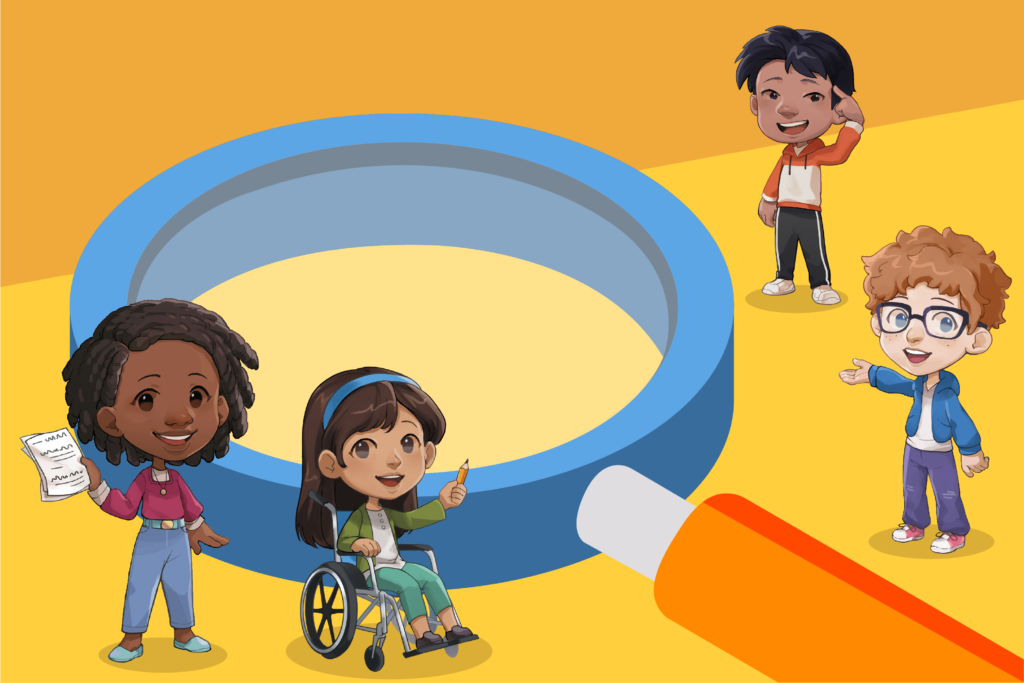
Develop inquiry skills
Help your students put on their historian hats as they develop life-long inquiry skills to solve each mystery. By placing students in the role of detective, you can give them a fun and exciting purpose for learning.
Teach with Spanish versions
Engage Spanish-speaking students and multilingual learners with a growing library of Spanish-language mystery-themed lessons. Spanish-translated resources will introduce inquiry, and help build content knowledge and critical thinking skills.
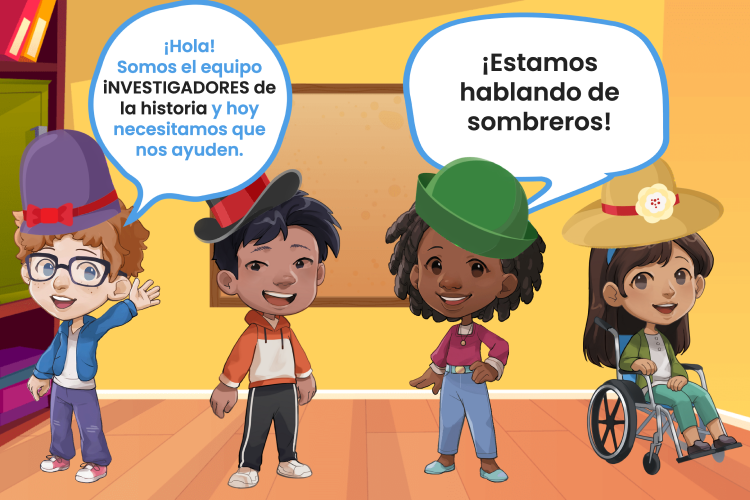
Ways to use Private i History Detectives in the classroom
Introduction
Introduce and break down primary sources for elementary students, creating curious minds ready for learning.
Literacy
Make social studies achievable in busy elementary classes with lessons that integrate social studies with literacy.
Extension
Make learning objectives stick and leverage classroom learning by adding hands-on activities to your existing materials and teaching methods.
Narration
Utilize narration-enabled Google Slides decks to bring lessons to life and make lessons more accessible to all learners.
Most popular Private i History Detective units
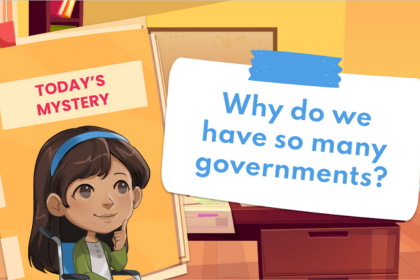
Our government has a rich history. But when did it all start, and what does it all mean? In this inquiry-based lesson, students will learn about how life under British rule and the Articles of Confederation shaped what Americans wanted in their new government.
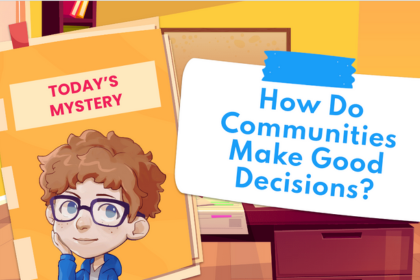
It’s never too early to be a good citizen. In this unit, students will be introduced to citizenship and leadership. Students will work together to create a classroom book on the rights and responsibilities of citizenship.
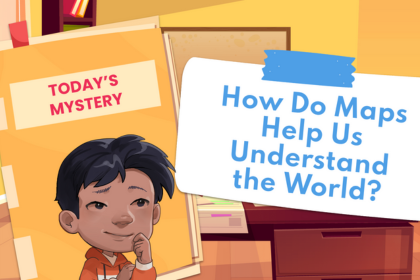
Maps are our guides to the world! Students will explore how maps can tell us where we are and help us get where we want to go. In this inquiry-based unit, students will learn the basic vocabulary of maps and about the concept of map projections and distortion.
What makes Private i History Detectives unique
Private i History Detectives place elementary learners at the center of the action by challenging them to act as history detectives. Lessons ask students a big question and guide them to use primary sources to form conclusions. Private i History Detectives work well for students, as they:
Empower and teach students to situate primary sources in history and consider an author’s purpose.
Give students the opportunity to practice observation, close reading, comparison, and making inferences.
Invite elementary students to take part in the learning with inquiry-based lessons.
Why Private i History Detectives work for educators
Private i History Detectives provide educators with a curriculum that is easy to use and adaptable and includes engaging activities that center lessons on inquiry and primary source analysis. Each grade band includes an introduction to inquiry unit that provides a model for teaching with inquiry. Mystery-themed lessons expose students to multiple types of sources, including photographs, video, and text, all with audio support.
Private i History Detectives are the next evolution of History’s Mysteries, a curriculum created by Laurie Risler and Kelley Brown, who continue to work with iCivics on the development of new resources.
Explore more resources for teaching civics
Looking for more?
Have a question?
We’ve got answers. Get help with tasks like making assignments or setting up Google Classroom rosters.
